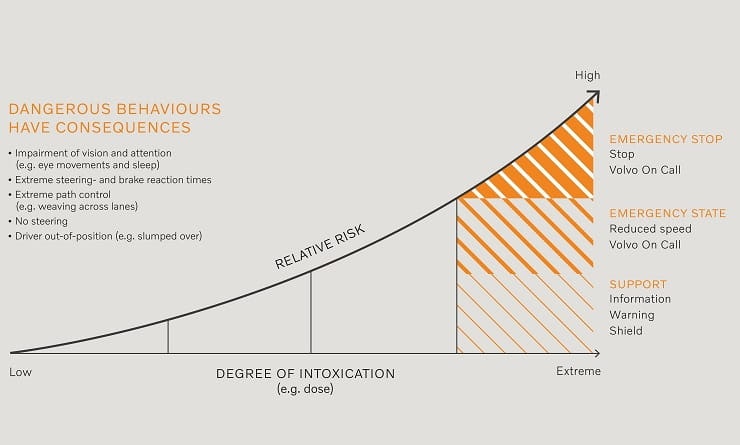Volvo's plans to combat bad drivers
By Ben Purvis
Motorcycle Journalist
21.03.2019
For years Volvo drivers have been stereotyped as the motorcyclist’s enemy. The premise is that since they’re assured of their own security in their airbag-filled safety cages they’ll ignore the safety of more vulnerable road users like us.
But the firm’s latest safety development is one that puts others at the top of the agenda, albeit in a Big Brother fashion, by deploying spy cameras focussed on their own cars’ drivers and tied into systems that will intervene if they detect drunken or distracted behaviour, perhaps even including texting.
The firm recently revealed that all its future models will be speed-limited to 112mph from 2021 and in a new release Volvo says:
Apart from speeding, which the company aims to help combat with a top speed limit, intoxication and distraction are two other primary areas of concern for traffic safety. Together, these three areas constitute the main ‘gaps’ towards Volvo Cars’ vision of a future with zero traffic fatalities and require a focus on human behaviour in the company’s safety work as well.
For example, figures by NHTSA show that in the United States, almost 30 per cent of all traffic fatalities in vehicles in 2017 involved intoxicated drivers.
Volvo Cars believes intoxication and distraction should be addressed by installing in-car cameras and other sensors that monitor the driver and allow the car to intervene if a clearly intoxicated or distracted driver does not respond to warning signals and is risking an accident involving serious injury or death.
That intervention could involve limiting the car’s speed, alerting the Volvo on Call assistance service and, as a final course of action, actively slowing down and safely parking the car.
The company says that the cameras will be backed up with sensors measuring steering inputs and reaction times, and monitoring the car’s behaviour to see if it’s weaving between lanes, while also watching out for whether the driver is taking their eyes off the road. That means it will be able to tell if they’re nodding off or even if they’re looking down at their phones.
When alerted, the system starts to take over the driver’s responsibilities, slowing down and calling the company’s own ‘on call’ assistance service, who can speak to the driver. If there’s still no response, the car can ultimately bring itself to a complete halt.
Good news as a system to end dozy driving, or a terrifying vision of a permanently-monitored future?
Share on social media:
